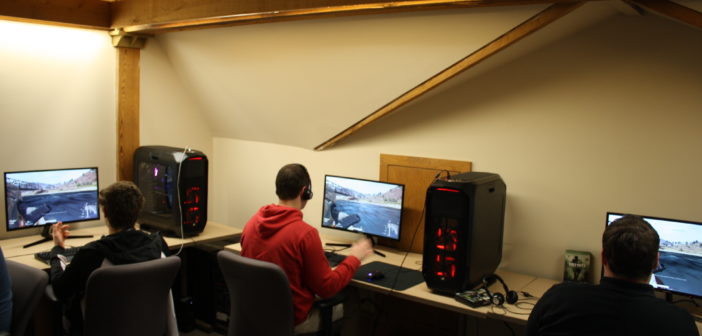Is competitive video gaming a sport? North Central sure thinks so and as such has created NCC eSports, a club that hopes to produce teams for the biggest competitive video games on the market.
ESports has grown nationally within the last few years, with gamers being paid to compete in teams playing competitive online games such as “League of Legends,” “Overwatch” or “Starcraft,” to name a few.
North Central’s very own eSports club made its debut in October, the fliers stating an intent to create competitive teams to rival other college teams in the Midwest while remaining a friendly social environment for those seeking to play games with friends.
The club’s origins date back to 2016, according to McLean Holmes, the club’s president: “Matt Burden was asked by the president (Troy Hammond) to look into what we could do to create an eSports team to compete against Wheaton College.” Other colleges had been starting teams of their own, and it was North Central’s turn to pick up the controller.
“I was familiar with other colleges around (Robert Morris University in Chicago, to name one) that offered thousands of dollars in scholarships based on your performance in certain competitive video games,” said Robert Freas, the captain of NCC eSports’ “League of Legends” team. “Since my freshman year, I had wished that I could be a part of it, and it wasn’t until the club’s founding this year that it was a reality for me.”
“It excites me beyond belief,” Holmes said, reflecting on the growing popularity of eSports. It does not take a gamer to understand the excitement. Holmes explained that he is “personally not a big gamer, but from being exposed to this community, I have seen that it is a fast-growing trend and activity. On campus, we have a large community of students who enjoy partaking in desktop gaming as well as our community game nights.” However, with this growth comes much debate.
“Is it really a sport?”
This is a question all too commonly asked as eSports gains more traction. Even ESPN.com features eSports prominently within its own dedicated section and, as Freas states, “the final competitions for (“Counter-Strike: Global Offensive”) are actually televised.”
Yet still, video games receive a stigma, as they do not involve the same degree of physical activity, a key element of what people perceive to be a sport. Despite this, proponents of eSports are quick to point out just about everything else that makes competitive gaming a sport.
As ESPN.com editor-in-chief Chad Millman put it, “who cares about the question, right? At the end of the day, it’s cool, it’s intense, the competition is crazy, it has million-dollar performers, it has high stakes, it has owners who are trying to steal team members from different teams, it has everything that makes sports interesting to cover.” When you put it that way, it does not seem much different from baseball or football.
Freas said, “the professional and collegiate teams around the US have practice schedules, get funding and sponsors for their team’s equipment, and have millions of fans across the world.” He espoused the dedication and work that, like any sport, goes into eSports.
“They have to work on their dynamics as a team, cut players that just aren’t fit for the team’s success, and the teams even have coaches that analyze the performance of their opponents and attempt to form strategies around that,” said Freas.
But creating eSports teams, like creating any sports team, requires good players. “Not just people that play it regularly/recreationally, but players that are ranked among the top five percent of players on the entire server on a team,” explained Freas.
NCC eSports is still new, and thus lacks the roster needed to make North Central a big player in collegiate competitive gaming. That won’t stop Freas though, who continues to aim higher for North Central’s next big sports team: “Over time, I really do hope that NCC’s eSports teams will have incredible rosters ready for next year’s competitions.”

